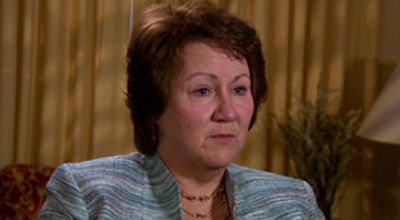Ex-Manager Exposes Planned Parenthood ‘Webcam Abortions’
Pro-lifers in tiny Storm Lake, Iowa, consider what’s happened in their community in the last several years to be a modern-day miracle.
The story began in 2007 when Sue Thayer, the manager of Storm Lake’s Planned Parenthood clinic, learned that Planned Parenthood of the Heartland would begin performing webcam abortions at every Iowa facility.
Although Thayer personally opposed abortion, she previously felt comfortable managing her clinic because it did not offer the procedure.
“I started at Planned Parenthood feeling like I would be helping women,” she explained to CBN News.
Webcam Abortions
Thayer says her life changed at a managers’ meeting in 2007 when she learned about the new procedure. Planned Parenthood of the Heartland told staff it would begin performing webcam abortions via Skype.
These abortions are a type of telemedicine that allow a doctor to visit with a patient remotely and then dispense abortion pills using a computerized medicine cabinet. In another clinic, the patient takes one pill to kill her unborn child and then takes another at home to expel it.
Planned Parenthood touts the new procedure as a way to more efficiently deliver health care to rural women.
“The staff was instructed to say, ‘We can take care of that problem today,’ 45 minutes in and out,” Thayer recalled.
The efficiency also allows Planned Parenthood to achieve greater cost-savings, Thayer said. It also increases the productivity of its small pool of abortion doctors.
“They’re having to come up with creative ways to increase and leverage the doctors they do have who will do abortions,” Dr. Charmaine Yoest, president of Americans United for Life (AUL), told CBN News.
Red Flags
As Thayer began to learn more about how Planned Parenthood would roll out the new abortion procedure, red flags began to wave and the prospect of overseeing it became daunting. She said when she asked to alert doctors in her community about the abortions, Planned Parenthood said no.
She was also concerned to discover that Planned Parenthood would require her and other non-medical staff to perform transvaginal ultrasounds.
“My boss said, ‘If you’re breathing you can do it. It helps if you’ve run a joystick because it’s a lot like playing a video game,'” Thayer recalled.
Thayer was also worried about the so-called “off-label” use of RU-486, the abortion medication that Planned Parenthood uses. “Off-label” refers to the practice of disregarding FDA regulations in dispensing the pills.
“The FDA had approved of these medicines, Mifeprex and Mifepristone, up through day 49,” Thayer said. “But right out of the chute Planned Parenthood was giving them up to day 63.”
Doctor visits are also short-changed. It’s another reason why pro-life organizations like AUL want states to toughen penalties for disregarding FDA rules.
“The way this drug, RU-486, was approved from the FDA was that it required three doctor visits. Well, it’s very expensive for the abortion industry to comply with that,” Yoest said.
A Matter of Conscience
Thayer believes her concerns and complaints led Planned Parenthood to fire her in late 2008. A short time later, the fine print on her severance package caught her eye. Thayer would have to agree not to speak out about what she’d seen at Planned Parenthood in order to receive her final check.
“I had enjoyed great pay, great benefits and insurance for myself and all my kids,” Thayer said. “But I thought, ‘It’s not worth it. We’ll sell the house.'”
After Thayer refused to sign the agreement her life changed again. Pro-lifers in Storm Lake began to approach her and invited her to meet with them. Thayer remembers the first time she explained how webcam abortions work.
“As I told them the story of how it happens,” she recalled, “the button on the computer and the drawer popping open, I could see the shock and horror on their faces.”
From there, a small group organized a 40-Day-for-Life prayer vigil outside her former clinic.
“I remember the staff coming, my former co-workers and it was awkward,” said Thayer. “But I knew I was in the right place, probably for the first time in my life.”
A ‘Modern-Day Miracle’
The vigil brought together churches in Storm Lake and united the pro-life community. Then just a few months later, Planned Parenthood announced it was closing the clinic. Planned Parenthood of the Heartland told CBN News it has no comment on the closure or this story, but Thayer says when she heard the news she was stunned, knowing how profitable the facility had been.
“I have absolutely no explanation for it except God is good and He answers prayer,” she said.
The latest answer to prayer: More Planned Parenthood clinics closing in northwest Iowa and the opening of Storm Lake’s new Cornerstone for Life Pregnancy Resource Center. Thayer is now heading the effort to minister to women facing crisis pregnancies in her community.
At an open house celebration last month, community members called the recent chain of events in Storm Lake a modern-day miracle.
“I just remember praying, ‘Lord, just close this place [the Planned Parenthood clinic] and put a place of life here,” Pastor Loren Carlson of Faith Bible Christian Outreach Center said.
Prayer vigil coordinator Crystal Cook remembers how people flocked to pray during the vigil.
“There were people that would stop on the road and just come and pray,” she said. “They weren’t even part of it and they’d say, ‘Can we pray?’ and we’d say, ‘Sure.'”
“It’s a lot that’s happened in a short amount of time,” center volunteer Andrea Hogrefe said, “and I think it’s just answered prayers.”
While Planned Parenthood has told workers it plans to implement webcam abortions nationwide, so far they’re only offered in Iowa and Minnesota.
Four states currently ban the practice and six are considering legislation to limit or penalize those who don’t follow FDA regulations in dispensing RU-486.














































